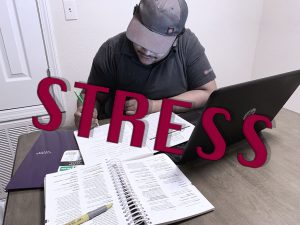
Labor laws fall short for college students

College students are overworked at part-time jobs. When asked about work complaints, students who were interviewed for this article mentioned their employers didn’t offer breaks, regularly shortened break time, disregarded previous schedule agreements and required them to work shifts less than 12 hours apart. How does this impact a student’s academic success and what can be done to help the current state of labor laws?
These conditions may seem unfair or even illegal; however, these issues are completely acceptable under Texas law as Texas does not require that employers offer breaks, strictly stick to agreed work schedules or give workers fair time between shifts. To be clear, the law does require that employees be paid for short breaks throughout the day if the employer chooses to allow them, it does not require them to provide those breaks.
Texas employers are not required to notify employees of changing schedules or maintaining a set schedule from week to week. Students who find part-time jobs before or during the semester may discuss hours with their manager to ensure they won’t be called into work during class days. Unfortunately, there is no law or regulation that holds managers accountable for that agreement. If an employer chooses to schedule an employee during school hours, the employee can be fired for not showing up. When students begin the enrollment process from semester to semester they may try to schedule classes around their current work times, but given that nothing is set in stone it is often an impossible task.
When asked about free time, the students expressed that they did not have enough time between shifts to complete necessary tasks for school or even life. The average amount of time per week that should be dedicated outside of class to school work is about six to nine hours, often more. The students said that they struggled to find time for their various responsibilities.
Furthermore, student organizations are a vital part of the college experience as they offer students special skills, resources and opportunities to build their resumes. With compact schedules, many students cannot become members because of work.
Texas law, thankfully, does require that employees be given a 24 hour rest period every seven days; however, that only applies to those who meet a full 40 hours a week. Therefore, students who work part-time may encounter situations where they have as little as five hours between shifts on top of school and other responsibilities.
The students also described a lack of cooperation or resources offered by professors and administrators. While a student’s college career is important and their work situation is not in the control of college campuses, students need help in not only succeeding in class but managing their time as far as work. After all, rent is just as important as good grades.
College campuses must make more of an effort to offer students resources to aid in managing work time and finding part-time jobs that are willing to work with students. Many campuses already offer job-seeking portals; however, most of them are geared toward full-time careers or post-graduation options.
UHCL Counseling Services does offer a handout on time management which discusses how students can make weekly schedules by the hour and make more efficient use of their free time. Although it is implied that students should include their work schedule into the planner, the introduction, which breaks down time, states that students roughly have 10 hours of free time left each day. However, the handout does not consider a student who may be working as much as eight hours a day leaving them only 2 hours of free time, a ridiculously short amount of time for homework, social interaction and other variables such as family responsibilities. For more information about time management, provided by UHCL’s Counseling Services visit their webpage on the UHCL website.
Additionally, Texas labor laws need to be adjusted to benefit not only students but workers of every kind. Some states such as California, Colorado, Kentucky, Nevada, Oregon and Washington, require that employers provide workers with a 10-minute break every four hours and other states require at least six hours of rest between shifts.
It may seem like there is nothing that can be done to make these changes happen but, of course, concerned readers can write their local legislatures or contact the U.S. Department of Labor for more resources at 1-866-4-USA-DOL (1-866-487-2365) or Contact DOL.
